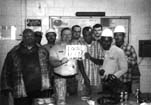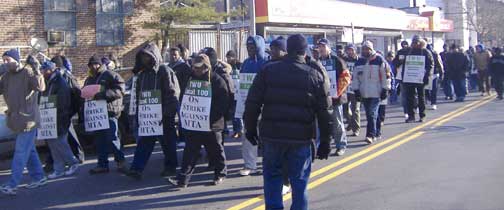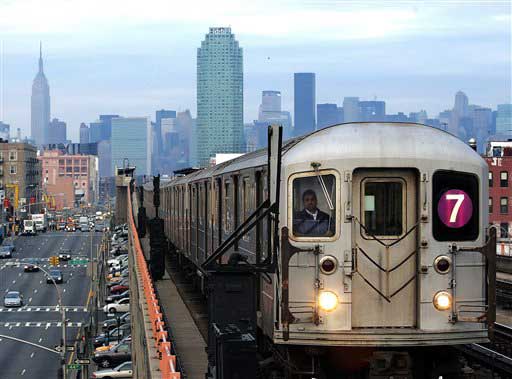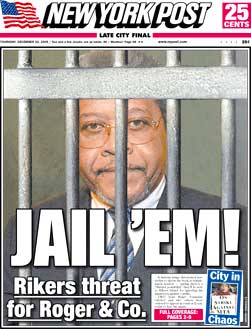Power of Labor

Charleston
Five longshoremen arrested for defending picket lines against cop
attack
(January 2000).
click
on photo for article

South
Carolina clay miners appeal for solidarity in fight for their union
(October
2001).
click
on photo for article
December 2005
 Transit strikers at East New York depot/shop, December 21. (Internationalist photo) TWU Union Tops Cave, Call Off Strike DECEMBER 22 – Under pounding by the capitalist politicians and an orchestrated anti-union hate campaign in the bourgeois media, this afternoon the leadership of Transport Workers Union Local 100 caved in and called off the mass transit strike that in three days has thrown New York City into turmoil. The walkout, the first NYC transit strike in 25 years, shut down the largest subway system in the world, transporting 7 million passengers a day. Yet although the strike was 100 percent effective, Local 100 president Roger Toussaint accepted a state “mediator’s” recommendation, which was then endorsed by the union executive board, to send the members back to work. No details were released, but there was no provision for amnesty for strikers against penalties under the state’s strikebreaking Taylor Law. TWU leaders proclaimed that “a deadline is a deadline,” but then ordered the membership to stay on the job past the midnight December 16 contract deadline. The union has a longstanding principle, chanted over and over by the strikers, of "no contract, no work." No contract agreement was reached, but the membership was ordered to take down the picket lines anyway. The press hints at a deal worked out behind the scenes, yet the executive board was given no specifics: they blindly voted on faith. Class-conscious workers reject secret deals negotiated behind the backs of the union ranks. And it should be clear to all that TWU workers are in a far weaker position to reject a giveback contract with the strike called off. The TWU leaders’ termination of the strike imperils the livelihoods and futures of the membership. On the picket lines, supporters of the Internationalist Group have been given a warm welcome throughout. Our call for an all-out New York transport strike and daily strike updates have been well-received by hundreds of strikers at key locations around the city. Today at the mass picket outside the Kingsbridge bus depot and 207th Street subway yard in Upper Manhattan, TWUers cheered remarks by a member of the Professional Staff Congress at the City University of New York who called for the PSC to go out on strike alongside the TWU to smash the strikebreaking Taylor Law. Meanwhile, public opinion polls show that despite the media barrage and the racist smear campaign of the capitalist politicians, a majority of New Yorkers support the TWU's demands, and more blame the Metropolitan Transportation Authority than the union for the inconvenience of the strike. The powerful economic effect of the strike rattled city bosses. The militant sentiment among the thousands of TWU picketers at dozens of locations around New York worried both MTA management and the TWU Local 100 leadership. Many Local 100 activists were unhappy over the back-to-work order. A worker at the 207th Street yard remarked: “We've been lied to and deceived" by the MTA and "I don't trust them. Bottom line: I'd rather wait." Union members there said if the bargaining doesn't come up with an acceptable agreement, they may go out on strike again. At the Casey Stengel bus depot in Queens where IG supporters leafletted in the afternoon, a driver remarked: “I feel like we lost if we go back to work without a contract." We salute the New York transit workers for waging a powerful strike in defiance of draconian anti-labor laws, and urge the TWU ranks to throw back any giveback deal, insist on the union principle of “no contract, no work," and forge a class-struggle leadership. |
“A Bum Deal”: Rip It Up, Vote It Down! Workers Have the Power!
NYC Transit: Throw Back the Giveback
Contract!

Subway running again in Long
Island City on December 23 after Transport Workers
Union Local 100 leaders call off strike. Transit workers move New
York, they can
shut down New York. Reject the giveback contract! (Photo:
Frank
Franklin II/AP)
DECEMBER
28 – Nothing so concentrates the minds of Wall Street bankers, you
might say,
as much as the prospect of a New York City transit strike. So when the
33,700
workers of the Metropolitan Transportation Authority hit the bricks
December
20, shutting down the largest mass transit system in the country, the
reality
of the walkout by Transport Workers Union Local 100 certainly got the
bosses’ attention.
And everyone else’s.
For two and
a half days,
the TWU strike was 100 percent effective. No subways or buses with
passengers
moved. The seven million riders who normally take the MTA daily had to
scramble
to find some other mode of transport. Or not. Many trudged on foot for
miles.
Even with elaborate emergency transportation plans, enforced carpooling
and the
like, Midtown Manhattan was tied up for hours with monumental traffic
jams
where nobody moved. There were scenes of mass chaos at Grand Central,
Penn
Station and Jamaica Station in Queens.
The union
picket lines were
large, spirited and solid, at more than three dozen sites in all five
boroughs.
At least a dozen locations had more than a hundred picketers each of
strikers
who came out every day. Holiday shopping took a nosedive and economists
reported hundreds of millions of dollars a day in losses. Yet in spite
of the
hardships, and partly because of the racist vituperation against
“greedy” and “thuggish”
transit workers spewing out of the mouth of the billionaire mayor, the
transit
workers continued to enjoy wide public support.
According
to an NY1 poll on
December 22, more New Yorkers blamed the strike on the MTA than on the
TWU, 54
percent thought what the union was asking for was fair, 51 percent
though Mayor
Bloomberg’s handling of the strike was not so good or poor, and 69
percent gave
Governor Pataki thumbs down. While white middle-class suburban
commuters
groused about the strike in TV interviews, nearly three-quarters of
blacks and
Latinos, overwhelmingly poor and working-class, supported the TWU
demands.
And yet, on
Day 3 of the
’05 New York transit strike, TWU Local 100 president Roger Toussaint
caved in,
called it off and ordered the strike lines taken down. TWU picket signs
proclaimed,
“No Contract, No Work,” yet Toussaint sent strikers back to work
without a
contract. Other signs proclaimed, “TWU Says: No Givebacks.” But
yesterday,
Toussaint presented a giveback contract which was rubber-stamped by a
Local 100
executive board dominated by his supporters. It was a sellout of
the
transit workers by their leadership.
 Bosses
press was in foam-flecked frenzy over powerful NYC transit strike,
calling here to
jail Transport Workers Union Local 100 president Roger Toussaint.
Bosses
press was in foam-flecked frenzy over powerful NYC transit strike,
calling here to
jail Transport Workers Union Local 100 president Roger Toussaint.
Sure,
due to the
strike, the MTA dropped its demand that newly hired transit workers pay
6 percent
of their
wages into the pension fund that management has underfunded for years.
There’s
no two-tier contract with lower pay for new hires. Toussaint brags that
they
got “lifetime medical,” and “no broadbanding.” We’ll see. The 3
percent, 4
percent and 3.5 percent annual pay hikes barely cover inflation. But
now all
union members will pay 1.5 percent of their wages for health care,
previously entirely covered by the MTA. Plus $1,000 fines for every TWU
member
under the anti-strike Taylor Law. All this, even though the MTA is
sitting on a
$1 billion-plus surplus.
This is the
proverbial
camel’s nose inside the tent. It’s the opening wedge to stick transit
workers
with skyrocketing health care costs. Already, the New York Post
(28 December)
reports that the contract includes a clause saying “the union will have
to kick
in the difference if the cost of health care increases at a higher rate
than
their salaries do.” Soon Bloomberg & Co. will be demanding that all
city
workers be saddled with escalating medical insurance costs, and weaker
unions
will feel they have to follow the TWU’s lead.
But transit
workers do not
have to take this betrayal lying down. Today’s New York Times reported:
“Earlier yesterday, negotiators from the union and the authority were
discussing ways to sweeten the deal because of fears of widespread
rank-and-file opposition. If the members vote down the settlement, it
will put
Mr. Toussaint and the transportation authority in a difficult
position.” It
sure as hell will. But pushing for a big “no” vote in a mail ballot is
not
enough. TWU Local 100 members must prepare for an all-out
struggle to
win!
A mail
ballot is
anti-democratic, isolating union members in their homes where they are
subject
to the blaring anti-strike propaganda from the capitalist media.
Instead, TWU
militants should demand that Local 100 call a mass membership
meeting to
discuss and vote on the contract. But this time, unlike
December 10 at
the Javits Center, the ranks should control the discussion instead of
having a
rally for the union tops. Bottom line: no givebacks, period.
If the
giveback pact is
voted down, an elected strike preparation committee with
hundreds
of members representing every subway yard and bus barn should be formed
on the
spot. This should be repeated at every union shop, electing delegates
to a
central strike council who can be recalled at any time, and forming
local
committees to mobilize the membership. But beyond the question of
organization,
what’s key is to have a class-struggle program going
beyond
demands for a few dollars more.
There was
quite a lot of
opposition in Local 100 to calling off the strike and there are several
clots
of dissidents in the leadership. This is not surprising since Toussaint
was
first elected in 2000 at the head of the New Directions “reform” slate,
ousting
the openly pro-management Sonny Hall/Willie James gang. The opposition
groups
which purport to be a more militant alternative to the present Local
leadership
actually share the basics of its program – they just ask for “more,”
like
Toussaint did until he took office and began negotiating contracts for
“less.”
Toussaint’s
betrayal is not
personal, it is a direct result of the nature of the
pro-capitalist labor
bureaucracy, which seeks to act as a buffer between the union
ranks and
the bosses, and actually serves as the “labor lieutenants of the
capitalist
class,” as American socialist Daniel De Leon succinctly put it over a
century
ago.
Mike
O’Brien, president of
the TWU International, who showed up on the scene to denounce the
strike and
side with MTA management against Local 100, is an outright labor
traitor
who should be run out of the union movement. But even left-talking
out-bureaucrats like New Directions end up carrying out pretty much the
same
program of cutbacks when they get into office. Soon they hang up their
windbreakers and don expensive suits so they can socialize with
Democrats like
Hillary Clinton and Freddy Ferrer, who are all for using the Taylor Law
against
the TWU. These labor fakers are agents of the bourgeoisie within
the
ranks of labor.
Look at the
programs of the
union dissidents. The Rank and File Advocate put out a
four-page tabloid
earlier this month calling for a larger raise, better medical benefits,
an
improved pension, no givebacks, etc. Local 100 executive board member
Steve
Downs (a supporter of the social-democratic Solidarity outfit) wrote
that
“Toussaint cannot be trusted.” Local 100 E Board member Marty Goodman
(a
supporter of Socialist Action, another reformist outfit, and the
moribund
Transit Workers for a Just Contract) has put out several contract
bulletins
which “Demand 10, 10 and 10%! It’s Payback Time!!” Goodman and John
Mooney,
Local 100 vice president for stations, put out a flyer for 10-10-10%,
as did United for a Better Contract.
10-10-10%,
“just contract,”
“better contract” – these are all just economist demands,
begging for a
few more crumbs from the table of MTA chief Peter Kalikow. Can’t trust
Toussaint?
They should know. They all supported him for Local 100 president, and
ran on
the same slate with him in 2000. They sued the union in the bosses’
courts back
then, when the Hall-James crowd was running the local, and several of
them are
doing the same now with Toussaint, dragging the union into federal
court over
the undemocratic way Toussaint runs the union. This is crossing the
class line
to appeal to the enemy. We say: Labor must clean its own house.
An
occasionally more
militant-talking outfit is the Revolutionary Transit Worker, supported
by the
centrist League for the Revolutionary Party. RTW bulletins sometimes
talk about
socialism and revolution, but in practice, their program is the same as
the
leftovers from New Directions, only one step removed. While they
[remnants of ND] ran on
the
same slate with Toussaint, the RTW and LRP gave “critical support” to
ND, trying
to pressure these dyed-in-the-wool social democrats slightly to the
left. This
time around, the RTW continues this pressure politics by calling in a
December
13 leaflet to “Hold Toussaint to his promises” and headlining: “8%, 8%
and 8%,
No Givebacks or Strike!”
Most of the
reformist left
(Communist Party, Workers World, Socialist Workers Party, International
Socialist Organization) was hardly seen at the strike. One ostensibly
socialist
group with supporters in transit is the Spartacist League. The SL,
which played
an active role in the 1980 NYC transit strike, has been notably passive
in recent
years, flinching before threats of repression and tailing after the
union
bureaucracy (while making pro forma criticisms from the left). In the
1999
showdown, when there was a big push for a strike, the SL at first
called for a
strike; then, when a judge issued a blatantly unconstitutional ruling
banning
even calling for a strike, these pseudo-“revolutionaries” knuckled
under and
issued a leaflet for the “right to strike.” In 2002, they didn’t call
for a
strike until after Toussaint had a union meeting vote to authorize one.
This year,
the SL didn’t
actually call for a strike until after it was launched, finally issuing
a
leaflet, “Victory to the Transit Strike!” on December 20. Its earlier
article
urging transit workers to “Prepare to Strike” (Workers Vanguard,
9
December) had zero specifics about what such preparations might consist
of,
making it clear that the real content of this call was not to
call for a
strike now. During the strike
itself, teams of a couple WV salesmen would occasionally drop
by a
picket location, stand around selling their paper for half an hour
and then depart.
This pathetic response was hardly the action of an organization seeking
to build
a real proletarian vanguard.
In
contrast, over the
course of the strike, three different teams of Internationalist Group
supporters went to several key picket lines each, marching for several
hours
and distributing 1,000 to 1,500 Internationalist leaflets daily
with
updates and lessons from the strike events, while talking with
picketers. We
were universally well-received, and our leaflets were eagerly snapped
up and
read from beginning to end by strikers who got almost no information
from the union
about was happening in the strike. We met little overt anti-communism,
and
instead a good deal of curiosity about what “reds” had to say. On the
third day
of the walkout, at the 207th Street/Kingsbridge picket line of several
hundred
strikers, an IG supporter and activist in the Professional Staff
Congress (the
City University faculty union), got rousing applause when he told
workers they
were making history and argued for a joint strike to smash the Taylor
Law.
Instead of
tailing after
the TWU tops, saying “Toussaint and his cronies on the Executive Board
are
vulnerable to pressure” even after the Local 100 president refused to
strike
after the December 15 contract deadline (RTW bulletin, December 19),
what’s
needed is an open fight to oust the sellout misleaders and forge
a
class-struggle leadership in the powerful transit union. Such a
leadership would put forward a program going beyond economic issues to
raise a
series of transitional demands to serve as a bridge
leading from
the present struggles of the workers to a revolutionary fight
for power,
extending from the industry to society as a whole.
In transit
there should be
a fight for workers control. During the brief strike
there were
lots of chants about “union power,” about how the TWU is a “mighty,
mighty
union, a kick-ass union.” That power must be used or it means nothing.
Take the
linked issues of disciplines and safety. Bringing in an outside
consultant to
review disciplinary procedures won’t be any more effective in putting
an end to
the “plantation justice” than Toussaint’s earlier call for MTA
execs
to promise to cut down on disciplines. The union itself must act to
protect its
members, not through endless grievance procedures but by organized
action on
the job.
MTA
management fired a union
rep at the 240th Street barn after a supervisor claimed he was
anti-Semitic for
saying, “What am I, chopped liver.” When subway conduct Janell
Bennerson was
killed after her head slammed into a fence as she leaned out of the cab
as the
train was leaving a platform, the MTA blamed her for her death. When a
track
worker, Joy Antony, was killed while trying to flag and work on signals
at the
same time, under orders from management who sent out a three-man crew
instead
of the necessary four, the MTA tried to blame the supervisor instead of
inadequate staffing. The examples of such victimization are endless. So
how do
you fight it?
Local 100
members should
form union safety committees and insist that they
have the
power to shut down unsafe operations. The way to do that is to
actually
shut down a dangerous site, and bargain about it later. The TWU should
also
demand an end to the “random” alcohol and drug testing,
which is
a vehicle for arbitrary management harassment and victimization.
Instead of
trying to outdo the MTA and New York Police with scare propaganda about
“terrorism” in the subways, as Toussaint has been trying to do, the union
should demand an end to the NYPD bag inspections which are a
blatant
violation of the Bill of Rights “guarantee” against unreasonable
searches as
well as inevitably involving racial profiling. Class-conscious
militants call
for cops out of the unions – they are the armed
enforcers for the
bosses against the workers.
The
Internationalist has called
for the TWU to open the MTA books
so that everyone can see the financial shenanigans being carried out by
the
bosses to disguise huge surpluses as losses. This is not one more in a
long
list of empty bargaining demands, but something that should be
implemented by a
union committee. The Authority’s finances are, after all, supposed to
be
public. With a 40 percent increase in riders in recent years and no
increase in
the number of workers, there should be a fight for thousands more
transit jobs,
through a shorter workweek at no loss in pay, with
hiring to be
done exclusively through a union hiring hall, along with
union-run
training programs at full pay to enable transit workers to
move up to
more skilled positions. It would be possible to win wide public support
by
calling for doubling the workforce on weekends, when
trains are impossibly
crowded and infuriatingly late.
Various
left groups
proposed to win public support for the TWU strike by calling for “No
fare hikes
or service cuts” (RTW) or to “roll back the fare to $1” (Socialist
Alternative).
But why stop, or even start, there? The TWU has long had a paper
position for free
mass transit – that demand could be dramatized and popularized
by
literally ripping out the turnstiles in some prominent
location
in the middle of a hard-fought strike. Most importantly, it is vital to
wage a
campaign to get rid of the strikebreaking Taylor Law through
union action.
A week ago there should have been a mass mobilization by all of New
York City
labor in support of the TWU strike. Today, as transit workers face
$1,000-plus
fines and Local 100 was hit with a million-dollar-a-day fine, while its
leaders
still face potential jailing, there should be a union-based
mobilization
in the streets to demand the Taylor Law fines be cancelled.
The
deficits looming a
couple of years from now are not the result of rising health and
pension costs,
but of the ballooning MTA debt to pay off the bonds for its ambitious
expansion
program while subway maintenance is a mess. The MTA bosses could double
transit workers wages and the additional cost would be less
than the
cool $1.5 billion a year they are paying to the banks in debt service.
By 2020,
one-quarter of all MTA revenue will go to pay off Wall Street loans.
The
Internationalist Group calls to repudiate (refuse to
pay) the
debt, and for massive federal and state financing to
fill
any real deficit in the transit budget. But we also point out that it
will take
a socialist revolution to establish a modern, efficient, comfortable
and free
mass transit system. Then the MTA debt will be worth about as much as
old tsarist
bonds after the Bolsheviks took power in 1917, or Confederate bonds
after the
end of the U.S. Civil War.
New York
City transit
workers have real power. A strike shutting down the subways and busses
can tie up
the center of international finance capital, in this city where 54
percent of
families do not have a car (far less than anywhere else in the United
States)
and 72 percent of people entering Manhattan come on mass transit. The
bourgeoisie knows this and fears it. Yet they took the measure of the
Local 100
leadership, which also knew the potential power of the union and was
terrified
of using it for fear that the ranks would get out of control.
In the end,
the MTA
deliberately provoked the strike (what else could it mean for Kalikow
to show
up an hour before the contract deadline and suddenly make a
take-it-or-leave-it
“final offer” including a 6 percent pay cut to pay for the
existing pensions?)
in order to drain off militancy among the union ranks. And that was
what the
Toussaint leadership of Local 100 ended up doing, as it sent the
membership
back to work without a contract, and then agreed to a giveback pact
demanding
that union members pay for health care. This necessarily had a
demoralizing
effect on the ranks, but the Local 100 membership still has plenty of
fight
left in it. As Yogi says, “it ain’t over till it’s over,” and this
fight isn’t
over yet.
There
is no reason why TWU Local 100 couldn’t have won this battle hands
down, except
one: it was saddled with a leadership that was not prepared to do what
it took
to win. The first step in
overcoming
this crisis in working-class leadership is to draw the lessons of the
setback.
Lenin called the unions “schools for socialism,” and strikes a “school
for (class)
war,” because through these experiences, workers can draw conclusions
about
what’s necessary in order to win. And as the German communist Rosa
Luxemburg
wrote in her last article before she was assassinated in January 1919,
“a
revolution is the only form of ‘war’ ... in which final victory can
only be
prepared through a series of ‘defeats’.”
As in 1966
and 1980, a
transit strike that could win has to be fought politically. Toussaint
capitulated before the bourgeois offensive not because the union was
overpowered – quite the contrary, the strike threw the city into
convulsion –
but because he, like all pro-capitalist labor bureaucrats, aspires to
travel in
ruling-class circles, to hobnob with the filthy rich and powerful,
while
helping the capitalists resolve their “labor problems.” A
class-struggle
leadership of the unions would oust the pro-capitalist bureaucrats,
break with
the Democrats (and all bourgeois parties), and fight to build a
revolutionary
workers party. That is the program of the Internationalist
Group, and
we encourage interested transit workers to join with us in studying the
history
of struggles of workers and the oppressed, in order to prepare for the
coming
rounds. n
To contact the League for the Fourth International or its sections, send an e-mail to: internationalistgroup@msn.com